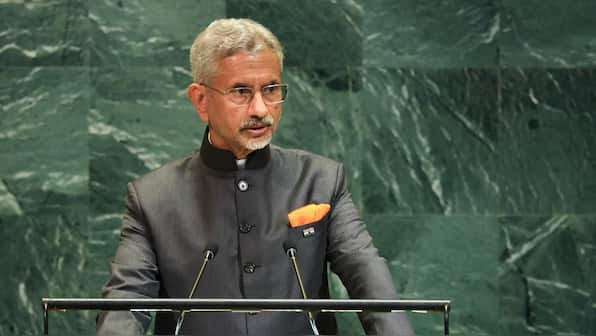BY TN Ashok
New York
September 30, 2025
youtube.com/@theflagpost
In a move that shattered diplomatic decorum and drew sustained international applause, India’s External Affairs Minister, Dr. S. Jaishankar, delivered a scathing and surgical attack on Pakistan at the 80th UN General Assembly. He branded the nuclear-armed nation the “epicenter of global terrorism,” asserting that “major international terrorist attacks are traced back to that one country.”
The address, a masterful display of diplomatic aggression, comes at a moment when relations between the two nuclear neighbours have plummeted to perilous new lows following a devastating terrorist attack in Kashmir and India’s unprecedented military response.
The Pahalgam Massacre and India’s ‘Operation Sindoor’
The latest chapter in this deteriorating relationship was violently opened on April 22 with the Pahalgam Massacre. Terrorists struck the scenic Kashmiri tourist spot, targeting Hindu pilgrims and tourists in an attack that killed 26.
The sectarian dimension—with witnesses reporting that victims were allegedly asked to recite the Quran before being shot—sent shockwaves across India, severely impacting tourism and crystallizing public rage against cross-border terrorism. The incident was viewed by the Modi government as a direct challenge to its efforts to restore normalcy and integrate Jammu and Kashmir.
Two weeks later, India responded with a calculated and decisive military operation. On May 7, 2025, “Operation Sindoor” saw precisely targeted missile and air strikes hit nine sites across Pakistan-administered Kashmir and Pakistan’s Punjab province. Indian officials emphasized that the 23-minute operation was “non-escalatory, precise and targeted terrorist training camps,” though Defense Minister Rajnath Singh later claimed at least 100 militants were killed.
At the UN, Jaishankar—in a stark defense of India’s actions—referenced the “destruction caused to multiple Pakistani air bases by Indian forces” and affirmed India’s “right to defend its people against terrorism.” This forceful response fundamentally altered the strategic calculus in South Asia, signaling India’s willingness to unilaterally strike terror infrastructure deep inside Pakistani territory.
The Irony of Pakistan’s Diplomatic Miscalculation

Jaishankar’s UN address skilfully exploited the awkward optics of Pakistan’s recent diplomatic push. Just days before the minister’s speech, Pakistani Prime Minister Shehbaz Sharif had visited the White House, attempting to leverage improved relations with the Trump administration to counter India. The photo-ops, however, did little to shield Pakistan from the mounting global concern over its role in regional terrorism.
Jaishankar’s warning—that those who “condone nations that sponsor terror will find that it comes back to bite them”—effectively neutralized any potential gains from Sharif’s Washington visit. The climax of this diplomatic maneuvering, however, lay in an act of pure, biting sarcasm and irony: Jaishankar had carefully avoided naming Pakistan directly, a sophisticated diplomatic gambit.
Yet, Pakistan’s decision to respond defensively to the un-named accusation proved to be a spectacular strategic error. India’s diplomatic team seized the moment, characterizing Pakistan’s reaction as nothing less than an “admission of terrorism”—effectively, as India claimed, admitting to being ‘terroristan’ and solidifying the narrative of its guilt on the global stage.
The sustained applause Jaishankar received underscored the delegates’ appreciation for India’s sophisticated diplomatic takedown, an approval that stood in sharp contrast to the walkout witnessed during Premier Netanyahu’s address just days prior.
A Nation’s Rage and the Nuclear Shadow
The fallout from the Pahalgam attack and Operation Sindoor has bled beyond diplomatic and military channels, manifesting dramatically in people-to-people relations. The depth of Indian public anger was showcased in the Asia Cup finals in Dubai, where cricket diplomacy gave way to public snubs.
After India’s victory against Pakistan, the team captain and players refused to receive the trophy from the Pakistani minister present, accepting it instead from a neutral official. More telling was the complete absence of the decades-old tradition of post-match handshakes, a vivid, televised crystallization of the breakdown in relations.
Jaishankar’s accusation that Pakistan operates “terror hubs on an industrial scale” and “publicly glorifies terrorists” represents a dangerous new low. It ratchets up tensions between two nations that have fought four wars and together possess over 300 nuclear warheads. His call for “much deeper international cooperation” and “relentless pressure put on the whole terror ecosystem” is a clear strategy to isolate Pakistan diplomatically and build global consensus for a sustained counterterrorism campaign.
The current crisis marks a fundamental shift: India is now treating cross-border terrorism as an existential threat requiring sustained international pressure rather than temporary military fixes.
For Pakistan, the convergence of military pressure from Operation Sindoor, diplomatic isolation at the UN, and ongoing economic constraints presents its most challenging foreign policy moment since the 1999 Kargil conflict. The rising tensions, fuelled by the Pahalgam tragedy and hardened by the sophisticated diplomatic duel at the UN, suggest that the nuclear shadow between India and Pakistan has never been darker.


